#1965 Selma to Montgomery marches
Explore tagged Tumblr posts
Text

👊🏾✊🏾 “When you see something that is not right, not fair, not just, you have to speak up. You have to say something; you have to do something.” ~ Congressman John Lewis (1940-2020) 🇺🇸
#John Lewis#Congressman John Lewis#civil rights activist#United States House of Representatives#United States Congress#5th congressional district of Georgia#Civil Rights Movement#the sixties#the sit in movement#Freedom Rides#Freedom Riders#1963 March on Washington#1965 Selma to Montgomery marches#1965 Bloody Sunday#sncc#Martin Luther King Jr#Fisk University#nonviolence#Congress of Racial Equality (Core)#SRC and VEP#March 2013#John Lewis: Good Trouble#Bobby Kennedy for President#King In The Wilderness#historical caricature#Black History Month
2 notes
·
View notes
Text

young activists at a Selma to Montgomery March, 1965
50 notes
·
View notes
Text
Good People Doing Good Things Meets Black History Month - Mr. Dabney Montgomery
It seems to happen every February … I fully intend to write a minimum of two Black History posts each week, but then I get sidetracked and the next thing I know, {POOF} — February is over! Today is February 28th, typically the last day of the month except this is a leap year, so I have two more chances! So, as I’ve done once or twice this month, I am combining ‘good people’ with Black…

View On WordPress
#Bloody Sunday 1965#Dr. Martin Luther King#John Lewis#Selma Alabama#Selma to Montgomery March#Tuskegee Airmen
0 notes
Text

James Baldwin listens to Dr. Martin Luther King, Jr. at the culmination of the Selma to Montgomery March, March 1965. Photo: Morton Broffman
272 notes
·
View notes
Text
John Lewis passed away shortly before the 2020 election. In the 1960s he was one of the "Big Six" leaders of the Civil Rights movement, along side Dr. King. He was the Chair of the movement's youth wing, Student Nonviolent Coordinating Committee (SNCC). In 1965 Lewis helped lead marches for voting rights from Selma to Montgomery. On the Edmund Pettus Bridge they were met by Alabama State Troopers who beat the marchers, they fractured Lewis' skull and he almost died. In later life John Lewis became a Congressman from Georgia. In Congress Lewis was the voice of the Democratic Party's conscience, speaking out for gay rights, Soviet Jews, gun control, immigration reform, a strong critic of George W. Bush and Donald Trump. He was arrested at protests and sit ins as a member of Congress, he believed as he often said in getting into "Good Trouble"
This election, go and vote, for the people who gave blood to make it possible for every American to have the right.
#John Lewis#Politics#US politics#American politics#civil rights#election 2024#vote#voting#history#black history
160 notes
·
View notes
Text

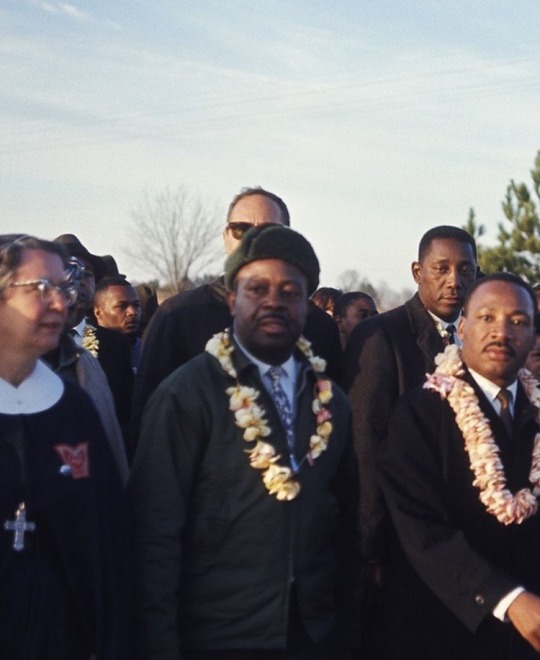


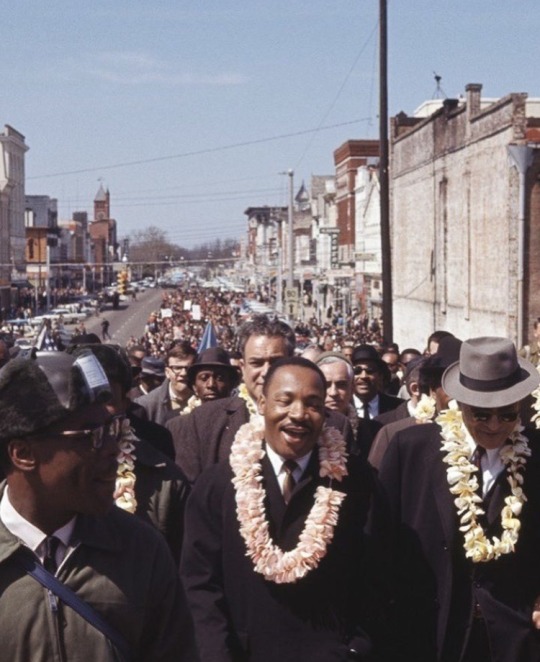

Martin Luther King Jr leading the Selma to Montgomery Civil Rights marches in Alabama, March 1965 🌸
241 notes
·
View notes
Text
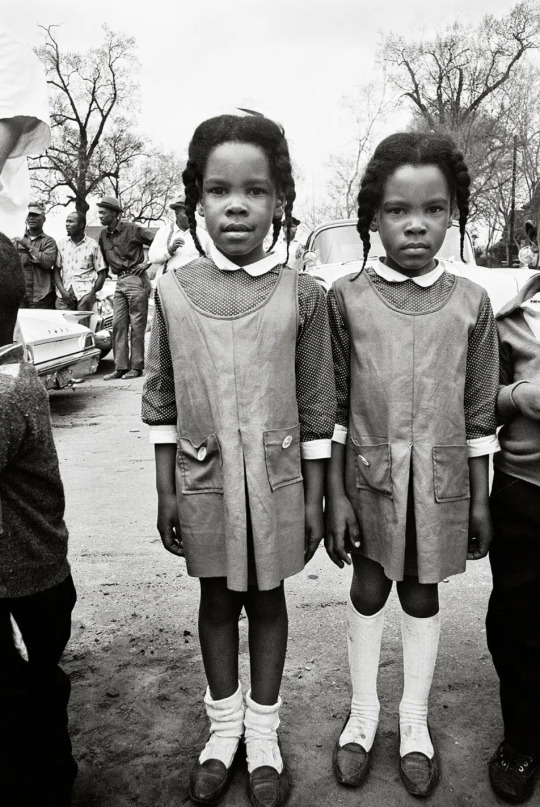
Twins Watching the Selma to Montgomery March, Alabama. Photo by Steve Schapiro, 1965
100 notes
·
View notes
Text

Steve Schapiro Rosa Parks and Comrades on the Selma to Montgomery Voting Rights March, Alabama 1965
100 notes
·
View notes
Text























Why "Not" Voting, is "Not" an Option!
Freedom Ain't Free, Y'all...
35 notes
·
View notes
Text
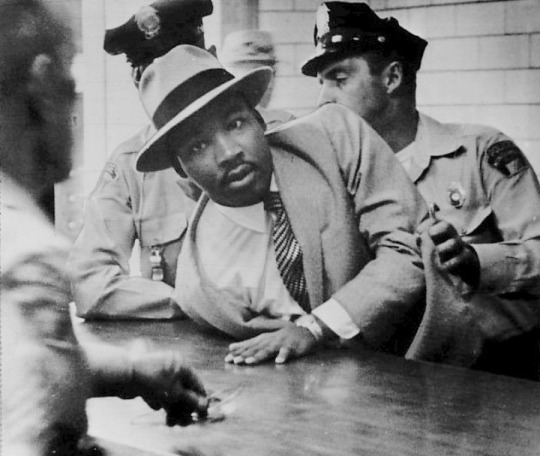
Martin Luther King Jr. was Arrested 29 times for these so-called crimes. Here are just a few occasions when he was arrested and why:
January 26, 1956 — He was arrested in Montgomery, Alabama as part of a "Get Tough" campaign to intimidate the bus boycotters. Four days later, on January 30, his home was bombed.
March 22, 1956 — King, Rosa Parks and more than 100 others were arrested on charges of organizing the Montgomery Bus Boycott in protest of Parks' treatment.
September 3, 1958 — While attempting to attend the arraignment of a man accused of assaulting Abernathy, King is arrested outside Montgomery's Recorder's Court and charged with loitering. He is released a short time later on $100 bond.
September 5, 1958 — King was convicted of disobeying a police order and fined $14. He chooses to spend 14 days in jail, but is soon released when Police Commissioner Clyde Sellers pays his fine.
October 19, 1960 — He was arrested in Atlanta, Georgia during a sit-in while waiting to be served at a restaurant. He was sentenced to four months in jail, but after intervention by then presidential candidate John Kennedy and his brother Robert Kennedy, he was released.
May 4, 1961 — He was arrested in Albany, Georgia for obstructing the sidewalk and parading without a permit.
April 12, 1963 — He and Ralph Abernathy were arrested in Birmingham, Alabama for demonstrating without a permit.
During his time in jail, he he wrote what is now known as his historic "Letter from Birmingham Jail."
June 11, 1964 — He was arrested for protesting for the integration of public accommodations in St. Augustine, Florida.
February 2, 1965 — He was arrested in Selma, Alabama during a voting rights demonstration, but the demonstrations continued leading to demonstrators being beaten at the Pettus Bridge by state highway patrolmen and sheriff's deputies.
Legendary civil rights activist Dr. Martin Luther King Jr. spent a night in the jail on a trespassing charge after he and others were arrested after they attempted to eat in the Monson Restaurant on June 11, 1964. The arrest was reported in The St. Augustine Record and is included in the state legislative committee's investigative report, "Racial & Civil Disorders in St. Augustine," February 1965.
•••
Martin Luther King Jr. fue arrestado 29 veces por estos supuestos “crímenes”. Estas son sólo algunas ocasiones en las que fue arrestado y el por qué:
26 de enero de 1956: Fue arrestado en Montgomery, Alabama, como parte de una campaña "Get Tough (Ponerse Firme)" para intimidar a los boicoteadores de autobuses. Cuatro días después, el 30 de enero, su casa fue bombardeada.
22 de marzo de 1956: King, Rosa Parks y más de 100 personas más fueron arrestados acusados de organizar el boicot a los autobuses de Montgomery. Esto en protesta por el trato que recibió Parks.
3 de septiembre de 1958: Mientras intentaba asistir a la lectura de cargos de un hombre acusado de agredir a Abernathy, King es arrestado frente al Tribunal de Registro de Montgomery y acusado de holgazanería. Poco tiempo después fue liberado, luego de pagar una fianza de 100 dólares.
5 de septiembre de 1958: King fue declarado culpable de desobedecer una orden policial y multado con 14 dólares. Eligió pasar 14 días en la cárcel, pero pronto lo liberan luego de que el comisionado de policía Clyde Sellers pagara la multa.
19 de octubre de 1960: Fue arrestado en Atlanta, Georgia, durante una sentada mientras esperaba que lo atendieran en un restaurante. Fue sentenciado a cuatro meses de cárcel, pero tras la intervención del entonces candidato presidencial John Kennedy y su hermano Robert Kennedy, fue puesto en libertad.
4 de mayo de 1961: Fue arrestado en Albany, Georgia, por obstruir la acera y desfilar sin permiso.
12 de abril de 1963: Él y Ralph Abernathy fueron arrestados en Birmingham, Alabama, por realizar una protesta sin permiso.
Durante su estancia en la cárcel, escribió lo que ahora se conoce como su histórica "Carta desde la cárcel de Birmingham".
11 de junio de 1964: Fue arrestado por protestar por la integración de alojamientos públicos en St. Augustine, Florida.
2 de febrero de 1965: Fue arrestado en Selma, Alabama, durante una protesta por el derecho al voto, pero las protestas continuaron y los protestantes fueron golpeados en el puente Pettus por patrulleros de carreteras estatales y agentes del sheriff.
El legendario activista de derechos civiles, Dr. Martin Luther King Jr., pasó una noche en la cárcel acusado de invasión de propiedad privada después de que él y otros fueran arrestados después de intentar comer en el restaurante Monson el 11 de junio de 1964. El arresto fue informado en el periódico The St. Augustine Record y está incluido en el informe de investigación del comité legislativo estatal, "Desórdenes Civiles y Raciales en St. Augustine", febrero de 1965.
#martin luther king jr#martin luther king day#blacklivesmatter#blacklivesalwaysmatter#blackhistory#history#blackhistorymonth#blackpeoplematter#blackhistoryeveryday#blackhistory365#blackhistoryfacts#black history is everybody's history#black history is world history#black history is american history#historyfacts#black history matters#black history month#black history#knowyourhistory#no justice no peace#historical#justice#share#justice system#english#spanish#read#civil rights#civil rights movement#martin luther king quotes
137 notes
·
View notes
Text
✊🏾 Just another late night working at my desk. While sketching out ideas for future projects, I decided to have Selma, Lord, Selma” play on the DVD player, rather than just work in gloomy silence. After doing the drawing of Stokley Carmichael on Sunday night, I hope to include more drawings in relation to Black History Month.
#Selma Lord Selma#late night movie#Black History Month#Black History Month 2023#Jurnee Smollett#Yolanda King#Clifton Powell#Mackenzie Astin#Walt Disney Television#Martin Luther King Jr#Jimmie Lee Jackson#Jonathan Daniels#Sheyann Webb#Rachel West#civil rights#voting rights#1965 Selma to Montgomery marches#Selma Alabama#John Lewis#Hosea Williams#Edmund Pettis Bridge#Amelia Boynton#Monday night
0 notes
Text

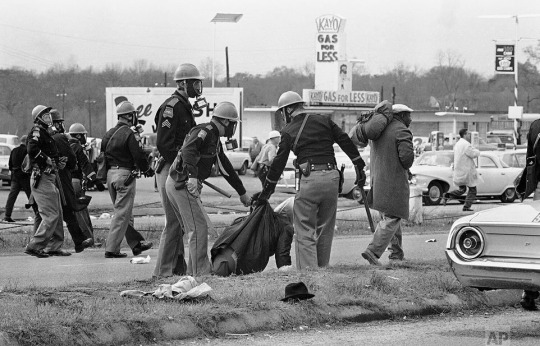


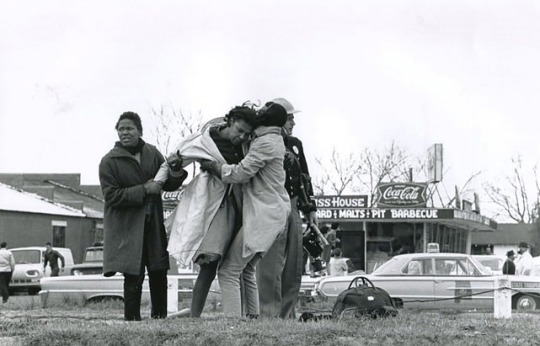
Today In History
The first Selma to Montgomery march began on Sunday, March 7, led by SNCC chairman John Lewis and the Reverend Hosea Williams of SCLC.
Predating the march, Reverend C.T. Vivian led a peaceful march to the courthouse in Marion, Alabama on February 18, 1965, to protest the arrest of DCVL member James Orange. On the way to the courthouse, Alabama state troopers attacked the marchers, shooting Jimmie Lee Jackson in the process. Jackson died eight days later, prompting James Bevel of SCLC to call for a march from Selma to Montgomery to speak with Governor George Wallace about Jimmie Lee Jackson’s death.
The march proceeded without any interruptions until the protesters arrived at the Edmund Pettus Bridge where they were met with violence by Alabama law enforcement officials. Amelia Boynton was beaten unconscious. John Lewis suffered a skull fracture from the attack, and later mentioned he thought he was going to die that day. After this terrifying ordeal was over, more than 60 marchers would be injured. This day would become known as “Bloody Sunday.”
CARTER™️ Magazine
#bloody sunday#salma#john lewis#carter magazine#historyandhiphop365#carter#wherehistoryandhiphopmeet#history#cartermagazine#today in history#staywoke#blackhistory#blackhistorymonth
42 notes
·
View notes
Photo


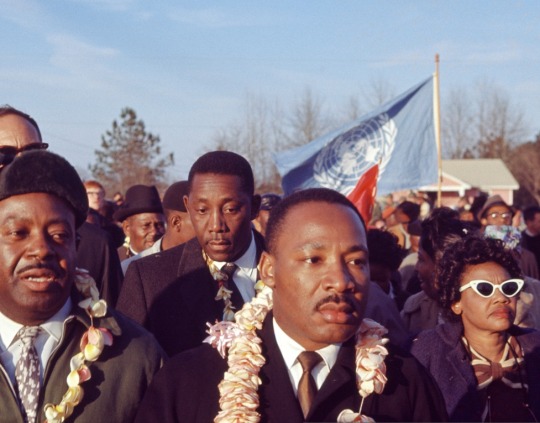


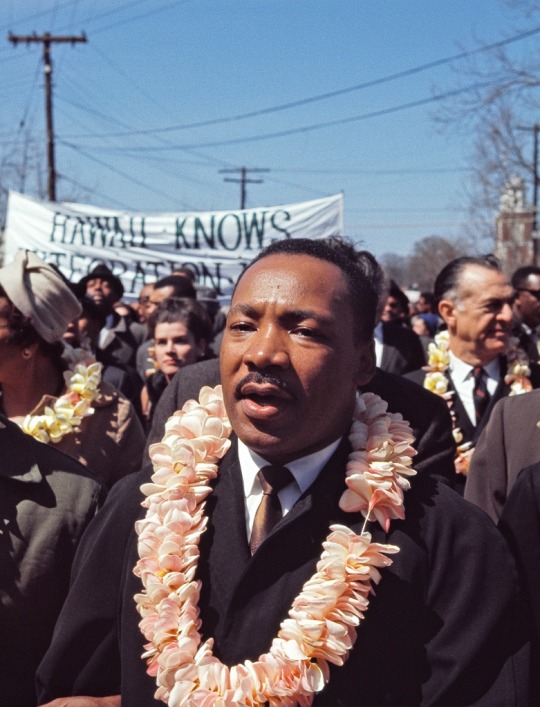
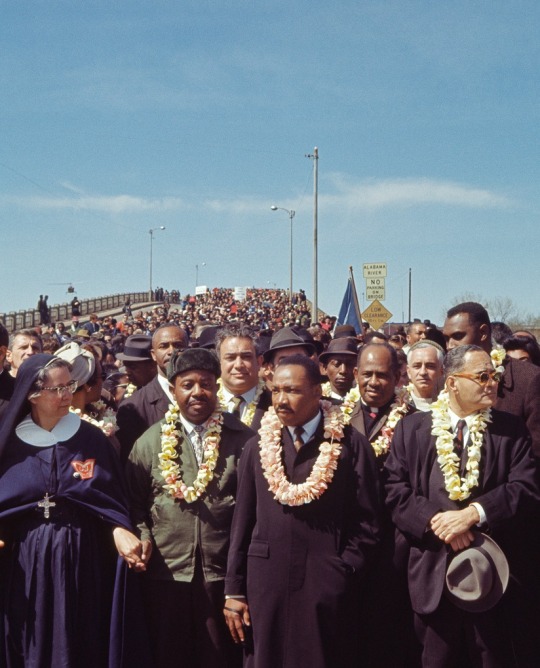
Dr. Martin Luther King, Jr. leading the Selma to Montgomery Civil Rights marches in Alabama, March 1965.
Photos by Bob Adelman
399 notes
·
View notes
Text

James Baldwin addresses the crowd after participating in the march from Selma to Montgomery in support of voting rights, in 1965. | Source:Robert Sengstacke Abbott
11 notes
·
View notes
Text
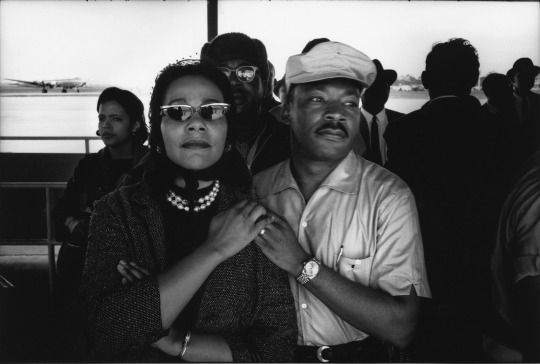
Selma to Montgomery March. Coretta Scott King and Martin Luther King Jr., Municipal Airport, Alabama, 1965
Photo: Dan Budnik
76 notes
·
View notes
Text
Today in Christian History
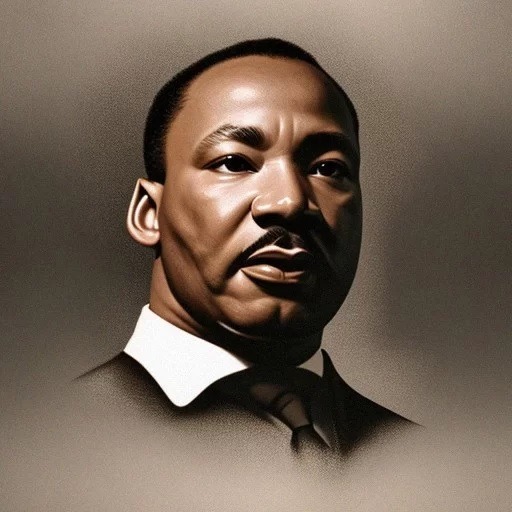
Today is Thursday, March 21st, 2024. It is the 81st day of the year in the Gregorian calendar; Because it is a leap year, 285 days remain until the end of the year.
1526: In Zurich, Conrad Grebel, Felix Manz, and George Blaurock escape from prison down a rope. Pacifist Anabaptists, they believed Christians should not hold power, but had been condemned to life imprisonment on concocted charges of fomenting revolution. Captured again that year, Manz and Blaurock will be again imprisoned, and Manz will be executed by drowning in 1527.
1556: Archbishop Thomas Cranmer is burned alive on orders of Mary Tudor, officially because of his “heresies” (he had been a leader in the English Reformation), but actually because of his role in providing King Henry VIII with a divorce from Mary’s mother Catherine many years earlier.
1656: Death of the archbishop of Armagh, James Ussher. His Annales Veteris et Novi Testamenti proposed a biblical chronology that placed the creation of the world in 4004 BC, and his dates will be incorporated into the notes of many Bible versions.
1806: Burial of David Dale, a Scottish manufacturer and philanthropist who sought to alleviate the condition of the poor by providing food, housing, and education at his mills. He had opened new mills to provide work for the unemployed. Strongly evangelical, he served as a lay preacher and headed many philanthropic endeavors, and was known as a lenient magistrate.
1843: Gungaram Mundel contracts cholera. He had been the first convert at Khari Baptist Church, Calcutta, and his profession of faith had eased the way for other Indians of the area to follow Christ.
1863: Death of Davis Griffiths, a missionary to Madagascar, who had translated the Bible into the Malagasy language.
1965: Baptist minister Martin Luther King, Jr (pictured above). leads more than three thousand civil rights demonstrators on a march from Selma, Alabama, to Montgomery. By the time they reach their destination four days later, the number of protesters will have swelled to twenty-five thousand.
1979: Muslim militants burn down the fifth-century historical Coptic Church of Saint Mary the Virgin in Old Cairo.
1994: The people of Augusta, Georgia, dedicate a monument on Green Street to the memory of Christian philanthropist Emily Harvey Thomas Tubman.
2007: Teacher Christianah Oluwasesin of Nigeria is beaten to death by a mob on an accusation that she touched a student’s handbag which had a Koran in it, thus defiling the Koran.
11 notes
·
View notes